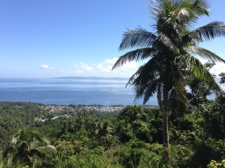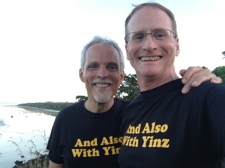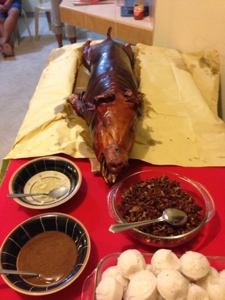Saturday
So, about this gecko.
When Evan was little we had a gecko. Evan named him Spot. It was interesting watching him shed, but he was a sullen pet. He once bit Evan on the finger, and their relationship was cool therafter. To my knowledge, Spot never made a peep.
So I want to know the story on this distant cousin on Capul, the one sounding a loud two-tone call under my window at 4:30 a.m. It’s not exactly mournful. He just sounds worried. Uh-oh, he chants. High then low, roughly a minor third. Uh-oh. Uh-oh.
Pause.
Uh-oh.
Good thing I’m a morning person.
This little toko (that is its name in Inabaknon) is one of a myriad wonderful things I will experience this day for the first time.
Take coconuts, for example.
You may think you have had a coconut.

Best Ever Coconut
But until you have had an immature coconut cut from a tree in the middle of the forest, by a man who has climbed fifty feet straight up (in about ten seconds) just so you could taste it, and had Reuben whack a sluice into its side with a machete, until you have poured the silky sweet water into your mouth, then let Reuben cut the thing in half, scoop out the soft membrane, and hand it to you like a tortilla made of pork fat and tasting like … nothing I have ever tasted before: well, until then, you have never had a coconut.
But I am getting ahead of myself.
To get to that coconut, we have to climb over the little ridgeline that runs down the spine of the island. This followed morning prayers and Eucharist at 7:00, so by the time Reuben is leading Marc and me up the steep trail, it is 9:00 and already impressively warm. The sun is out in full force, but I am so glad for the exercise, I don’t mind. The elevation gain to the top

Capul Town seen from the ridge
is only about 600 feet. And the surroundings are brilliant: grove after grove of coconut palms, thick tropical forest, clearings that are the homes of family and friends and relations of the scholars and board members and translators, and of course Marc knows everybody, so it is really both a hike and a progressive pastoral visitation.
There is a goal, besides the coconut: we’re headed to Sawang, one of the coastal villages on the other side of Capul, where Reuben has been engaged in a remarkable work of evangelism for more than five years. He’s leading the hike at an easy lope, wearing flip flops, and as I hump along behind him in my hiking boots, with Marc bringing up the rear, Reuben tells me a little of his calling.
Like most on Capul, Reuben is Roman Catholic. The translation work lit a fire under his faith, and he wanted to know how he could help others find the same renewal in Jesus Christ. Sawang is a mixed religious environment. Because of its remoteness, the priests don’t often get there (I’ll find out why first hand in a few minutes), so the religious life of the village has splintered into Catholics, Seventh Day Adventists, Jehovah’s Witnesses, and a couple varieties of Pentacostals. (I tell him about my dad’s home town in central Arkansas, where there were at least thirty churches for about 2,000 people. Reuben laughs: it is the same!). So about five years ago, Reuben began to make daily visits to the village. He started a sustainable farming project on land the Center had purchased nearby, and as they saw him go there every day, they became curious. The Center built a hermitage up the hill from the beach, and Reuben moved in, which gave him access to the village’s daily life. Soon he was teaching this new way of farming and talking a lot about Jesus while he taught. Then he began to offer Bible study.

The Beach near Sawang
Gradually people came to him from every church. He reassured their pastors that he was not in the business of wooing them to a particular sect, and as they saw the benefits for their people, they supported him. Eventually he had several study groups going, including a group for elementary-age children and a group preparing Catholic kids for confirmation, as well as the ongoing farming project. Reuben recently got married, so has been unable to get over to Sawang regularly the past several months, but much of the work is now strong enough so that the people are continuing it on their own.
From the ridgeline we start to descend a trail on the other side. It is rough and slippery, full of glass-like volcanic rocks (how does he do this in flip-flops), and we pass through an area that Reuben says gets very marshy in typhoon season, though it is not bad now. We pass through a grove of bamboo thirty feet tall and thicker than my arm; we meet a farmer and pause for the coconut break I have described, walk along a lovely stream past a series of little falls and soon we are in Sawang.
We talk with some of Reuben’s friends, look at a large canoe being built by a protege of Marc’s, then take an outrigger to the white-sand pocket beach on the land the Center owns. Marc’s hope is one day to have a Bible camp and retreat center there, though at the moment the only building is the hermitage. We have a swim in the glorious water, and about an hour later after a trip by canoe and motorcycle, we are back in Capul.

Blessing the Library
I spend some of the afternoon putting together a service for the blessing of the library that evening (prayers in English, psalm and readings in Inabaknon). Mercy and Pantit come by to be our guides for a motorcycle trip out to the northern tip of the island. There is an old lighthouse, still in use, and the remains of a Japanese gun emplacement. The sunset is beautiful,

And Also With Yinz!
and we are back at the center just as people are arriving for the celebration.
Abaknons know how to party as well as they pray. The blessing liturgy is reverent and efficient, and as I break out the holy water the assembly breaks out in spontaneous song, praising God as we go from room to room throwing holy water everywhere. By the time I get out of my rochet and chimere, the library is ready for dancing: two courtship dances, the first stately, the second wild, take us all back to the period of the Spaniards. Then a blessing, and dinner is served: lechon,

Lechon!
the classic slow roasted piglet served whole, with a variety of local dishes. Marc and I eat with the mayor and the principal of the high school. At the end, I am asked to give a benediction, which I do. I am aware this is an important moment in the life of this community and their priest.
By the time the party breaks up, and we all say our goodbyes, it is way past my bedtime. I am well-filled, well-danced, well-prayed. As I head to bed, Marc says with a grin, Make sure you tell them in Pittsburgh how we suffer out here in the field. I promise him I will.
I say my prayers, as has become my custom, while falling asleep. And the last thing I hear?
Uh-oh. Uh-oh.

Sunset on Capul
Pause.
Uh-oh.
Don’t worry, I whisper to my scaly friend. God is good.
